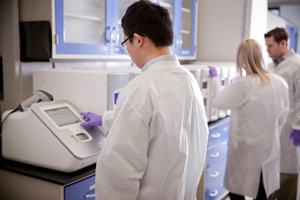Each year, more than 350,000 patients in the United States acquire bloodstream infections, resulting in nearly 100,000 deaths and over $15 billion in healthcare costs.1 Traditional diagnostics for bloodstream infections can take 2 -4 days, forcing clinicians to treat suspected bloodstream infections empirically with potentially harmful and unnecessary broad-spectrum antibiotics while awaiting blood culture results.
To confound matters, the treatment of serious bacterial infections in clinical practice is often complicated by antibiotic resistance. Resistance rates are increasing among several problematic gram-negative bacilli that are often responsible for serious nosocomial infections, including Acinetobacter spp., Pseudomonas aeruginosa, and Klebsiella spp.
The presence of multi drug-resistant strains of these organisms has been associated with prolonged hospital stays, higher health care costs, and increased mortality. The recent emergence of carbapenem-resistant Enterobacteriaceae (CRE’s) is especially troubling, as there are very few antibiotic alternatives available to treat these bacteria. While bloodstream infections caused by these antibiotic-resistant bacteria pose significant challenges for patient care, new molecular technologies that rapidly identify bacteria and corresponding antibiotic resistance determinants may enable earlier optimization of antibiotic therapy and promote better patient outcomes.
Speakers

Karen C. Carroll, MD, Professor of Pathology and Medicine, Johns Hopkins University School of Medicine
Dr. Carroll joined the faculty at Johns Hopkins in 2002 as the Director of the Division of Medical Microbiology and of the fellowship training program in Medical Microbiology. She was promoted to professor of Pathology in 2006. Dr. Carroll’s focused areas of clinical research at JHU have been in the areas of epidemiology and diagnosis of healthcare associated infections especially Clostridium difficile infections. She is a Fellow of the American Academy of Microbiology, the Infectious Diseases Society of America, and the College of American Pathologists. Dr. Carroll has authored over 175 peer-reviewed scientific papers. Dr. Carroll attended the College of Notre Dame of Maryland for her undergraduate work in biology and the University of Maryland School of Medicine for her medical doctorate, with a clinical fellowship in Infectious Diseases at the University of Massachusetts Medical Center and a clinical fellowship in Medical Microbiology at the University of Utah School of Medicine.
Blake W. Buchan, PhD, Assistant Professor of Pathology, Medical College of Wisconsin, Associate Director, Clinical Microbiology, Dynacare Laboratory
Dr. Buchan received his Ph.D. in Microbiology from the University of Iowa in 2009. Following graduation, Dr. Buchan completed a two year postdoctoral training at the Medical College of Wisconsin and has since continued his professional career at MCW, recently being promoted to Assistant Professor of Pathology. Dr. Buchan also currently serves as the Associate Director of Clinical Microbiology at Dynacare Laboratory, Milwaukee, WI. Dr. Buchan’s interests include MALDI-TOF MS, PCR, and Microarray-based diagnostics for the detection of bacterial, viral and fungal pathogens including methodologies for detection of these etiologies directly from clinical specimens. He has served as study coordinator and/or Principal Investigator for numerous clinical trials evaluating novel diagnostic assays and has a strong record of publication in peer reviewed journals.
Debra A. Goff, PharmD, FFCP, Clinical Associate Professor, The Ohio State University College of Pharmacy, Infectious Diseases Specialist, The Ohio State Medical Center
Dr. Goff joined The Ohio State University Medical Center in 1989 as an Infectious Disease Specialist. She is the director of the Infectious Diseases Residency program and a member of the Antimicrobial Stewardship Program (ASP). She is an Associate Professor at the College of Pharmacy. Dr. Goff received her bachelor of pharmacy degree, Doctor of Pharmacy degree, and performed her Pharmacy residency at the University of Illinois at Chicago. As part of ASP, she is actively involved in developing strategies to control the escalating rate of antimicrobial resistance. The team manages both community acquired and healthcare associated infections. Most recently, she developed a medical “app” called STAB-IT (Staph aureus bacteremia – is terrible) to help educate clinicians at OSUMC on the management of patients with Staph aureus bacteremia by using the iPad. Her research interest includes antimicrobial resistance, clinical outcomes research, antifungals and innovative ways to educate using technology.
Who Should Attend?
- Clinical Laboratory (PhD Microbiologist, Microbiology Supervisor, Clinical Laboratory Director, Medical Technologists)
- Clinical Pharmacy (keyword: Antibiotic Stewardship, ID Pharmacist)
- Infectious Disease Physicians
- Hospitalist (Internal Medicine)
- Critical Care Physicians
Xtalks Partner
Nanosphere
Nanosphere develops, manufactures and markets an advanced molecular diagnostics platform, the FDA-cleared Verigene System, for infectious disease testing in a near-patient setting. This easy-to-use platform offers laboratories a convenient, simple, and cost- effective solution for highly sensitive nucleic acid. A growing menu of FDA-cleared tests for bloodstream infections, GI infections, and respiratory tract infections enables the delivery of comprehensive, accurate diagnostic information to guide timely clinical interventions.
For more information visit http://www.nanosphere.us/
Media Partner
You Must Login To Register for this Free Webinar
Already have an account? LOGIN HERE. If you don’t have an account you need to create a free account.
Create Account



